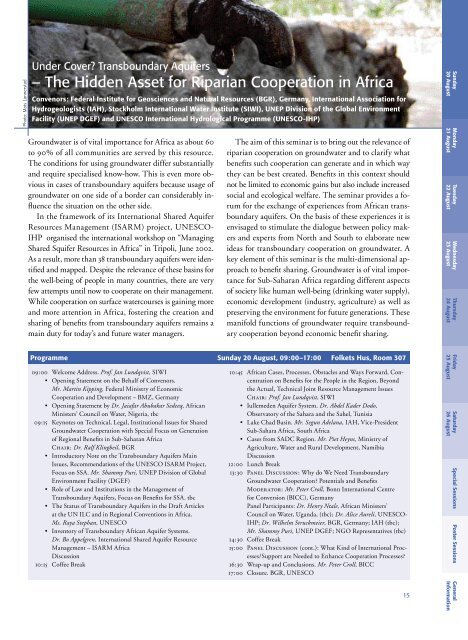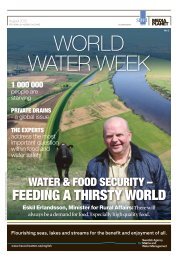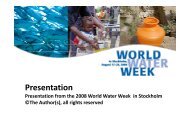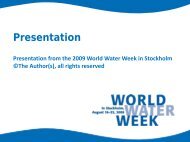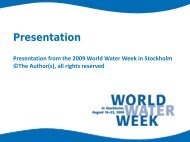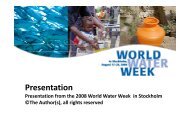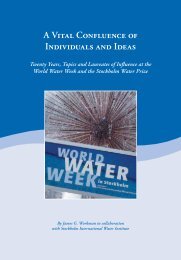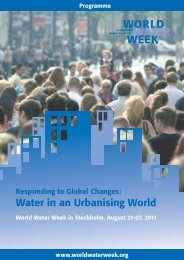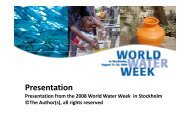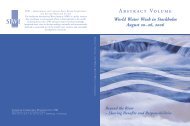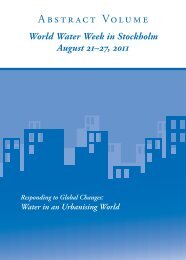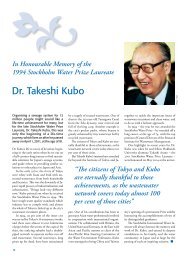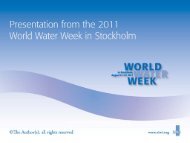Final Programme Beyond the River - World Water Week
Final Programme Beyond the River - World Water Week
Final Programme Beyond the River - World Water Week
You also want an ePaper? Increase the reach of your titles
YUMPU automatically turns print PDFs into web optimized ePapers that Google loves.
Photo: Mats Lannerstad<br />
Under Cover? Transboundary Aquifers<br />
– The Hidden Asset for Riparian Cooperation in Africa<br />
Convenors: Federal Institute for Geosciences and Natural Resources (BGR), Germany, International Association for<br />
Hydrogeologists (IAH), Stockholm International <strong>Water</strong> Institute (SIWI), UNEP Division of <strong>the</strong> Global Environment<br />
Facility (UNEP DGEF) and UNESCO International Hydrological <strong>Programme</strong> (UNESCO-IHP)<br />
Groundwater is of vital importance for Africa as about 60<br />
to 90% of all communities are served by this resource.<br />
The conditions for using groundwater differ substantially<br />
and require specialised know-how. This is even more obvious<br />
in cases of transboundary aquifers because usage of<br />
groundwater on one side of a border can considerably influence<br />
<strong>the</strong> situation on <strong>the</strong> o<strong>the</strong>r side.<br />
In <strong>the</strong> framework of its International Shared Aquifer<br />
Resources Management (ISARM) project, UNESCO-<br />
IHP organised <strong>the</strong> international workshop on “Managing<br />
Shared Squifer Resources in Africa” in Tripoli, June 2002.<br />
As a result, more than 38 transboundary aquifers were identified<br />
and mapped. Despite <strong>the</strong> relevance of <strong>the</strong>se basins for<br />
<strong>the</strong> well-being of people in many countries, <strong>the</strong>re are very<br />
few attempts until now to cooperate on <strong>the</strong>ir management.<br />
While cooperation on surface watercourses is gaining more<br />
and more attention in Africa, fostering <strong>the</strong> creation and<br />
sharing of benefits from transboundary aquifers remains a<br />
main duty for today’s and future water managers.<br />
The aim of this seminar is to bring out <strong>the</strong> relevance of<br />
riparian cooperation on groundwater and to clarify what<br />
benefits such cooperation can generate and in which way<br />
<strong>the</strong>y can be best created. Benefits in this context should<br />
not be limited to economic gains but also include increased<br />
social and ecological welfare. The seminar provides a forum<br />
for <strong>the</strong> exchange of experiences from African transboundary<br />
aquifers. On <strong>the</strong> basis of <strong>the</strong>se experiences it is<br />
envisaged to stimulate <strong>the</strong> dialogue between policy makers<br />
and experts from North and South to elaborate new<br />
ideas for transboundary cooperation on groundwater. A<br />
key element of this seminar is <strong>the</strong> multi-dimensional approach<br />
to benefit sharing. Groundwater is of vital importance<br />
for Sub-Saharan Africa regarding different aspects<br />
of society like human well-being (drinking water supply),<br />
economic development (industry, agriculture) as well as<br />
preserving <strong>the</strong> environment for future generations. These<br />
manifold functions of groundwater require transboundary<br />
cooperation beyond economic benefit sharing.<br />
Sunday<br />
20 August<br />
Monday<br />
21 August<br />
Tuesday<br />
22 August<br />
Wednesday<br />
23 August<br />
Thursday<br />
24 August<br />
<strong>Programme</strong> Sunday 20 August, 09:00–17:00 Folkets Hus, Room 307<br />
09:00 Welcome Address. Prof. Jan Lundqvist, SIWI<br />
• Opening Statement on <strong>the</strong> Behalf of Convenors.<br />
Mr. Martin Kipping, Federal Ministry of Economic<br />
Cooperation and Development – BMZ, Germany<br />
• Opening Statement by Dr. Jaiafar Abubakar Sedeeq, African<br />
Ministers’ Council on <strong>Water</strong>, Nigeria, tbc<br />
09:15 Keynotes on Technical, Legal, Institutional Issues for Shared<br />
Groundwater Cooperation with Special Focus on Generation<br />
of Regional Benefits in Sub-Saharan Africa<br />
Chair: Dr. Ralf Klingbeil, BGR<br />
• Introductory Note on <strong>the</strong> Transboundary Aquifers Main<br />
Issues, Recommendations of <strong>the</strong> UNESCO ISARM Project,<br />
Focus on SSA. Mr. Shammy Puri, UNEP Division of Global<br />
Environment Facility (DGEF)<br />
• Role of Law and Institutions in <strong>the</strong> Management of<br />
Transboundary Aquifers, Focus on Benefits for SSA. tbc<br />
• The Status of Transboundary Aquifers in <strong>the</strong> Draft Articles<br />
at <strong>the</strong> UN ILC and in Regional Conventions in Africa.<br />
Ms. Raya Stephan, UNESCO<br />
• Inventory of Transboundary African Aquifer Systems.<br />
Dr. Bo Appelgren, International Shared Aquifer Resource<br />
Management – ISARM Africa<br />
Discussion<br />
10:15 Coffee Break<br />
10:45 African Cases, Processes, Obstacles and Ways Forward, Concentration<br />
on Benefits for <strong>the</strong> People in <strong>the</strong> Region, <strong>Beyond</strong><br />
<strong>the</strong> Actual, Technical Joint Resource Management Issues<br />
Chair: Prof. Jan Lundqvist, SIWI<br />
• Iullemeden Aquifer System. Dr. Abdel Kader Dodo,<br />
Observatory of <strong>the</strong> Sahara and <strong>the</strong> Sahel, Tunisia<br />
• Lake Chad Basin. Mr. Segun Adelana, IAH, Vice-President<br />
Sub-Sahara Africa, South Africa<br />
• Cases from SADC Region. Mr. Piet Heyns, Ministry of<br />
Agriculture, <strong>Water</strong> and Rural Development, Namibia<br />
Discussion<br />
12:00 Lunch Break<br />
13:30 Panel Discussion: Why do We Need Transboundary<br />
Groundwater Cooperation? Potentials and Benefits<br />
Moderator: Mr. Peter Croll, Bonn International Centre<br />
for Conversion (BICC), Germany<br />
Panel Participants: Dr. Henry Ntale, African Ministers’<br />
Council on <strong>Water</strong>, Uganda, (tbc); Dr. Alice Aureli, UNESCO-<br />
IHP; Dr. Wilhelm Struckmeier, BGR, Germany; IAH (tbc);<br />
Mr. Shammy Puri, UNEP DGEF; NGO Representatives (tbc)<br />
14:30 Coffee Break<br />
15:00 Panel Discussion (cont.): What Kind of International Processes/Support<br />
are Needed to Enhance Cooperation Processes?<br />
16:30 Wrap-up and Conclusions. Mr. Peter Croll, BICC<br />
17:00 Closure. BGR, UNESCO<br />
15<br />
Friday<br />
25 August<br />
Saturday<br />
26 August<br />
Special Sessions Poster Sessions General<br />
Information


